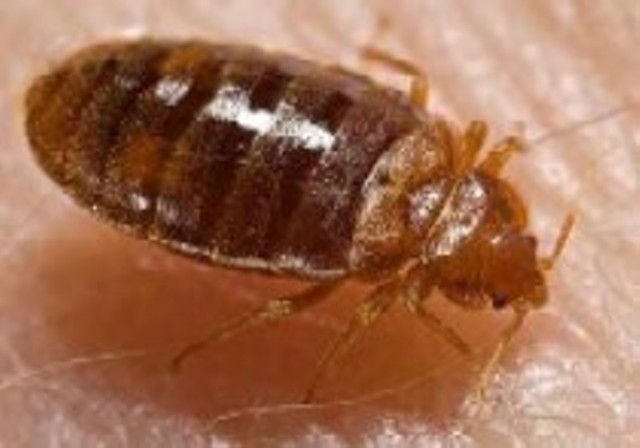Published August 18, 2010 at 11:25 a.m.
Bill Ward’s map of Burlington is dotted with red-topped pushpins. On his desk sit three plastic test tubes, taped off at the top, with specimens collected from local homes.
The items are evidence of a troubling trend: bedbugs. Last year, Ward’s code-enforcement office confirmed a single infestation in the city. So far this year, Ward has seen 12 bedbug cases — and he believes the number is larger.
“There’s a lot of embarrassment that goes with it, so I’m sure there’s a great deal of underreporting,” he reasons.
While almost half the bedbug reports have come from the Old North End, the problem isn’t confined to Burlington’s low-income neighborhoods. Nearly every section of the city has been affected, Ward says. The problem is so bad that Ward is convening a “bedbug summit” on August 18 with Vermont Tenants Inc. and the Vermont Apartment Owners Association.
For years, New York, Las Vegas and other U.S. cities have waged losing battles against bedbugs — bloodsucking insects that crawl out of used furniture, mattresses and suitcases at night to feed off their human hosts. Vermont had largely avoided the problem, which tends to be worse in multiunit rental properties in urban areas.
But local and state health officials and private exterminators all say they’ve noticed an uptick in bedbug reports over the last two years — and they expect the problem to get worse before it gets better. While no state agency counts the number of cases, anecdotal evidence suggests a growing problem.
“I get a half-dozen calls a week on them,” says state entomologist Jon Turmel, noting bedbug infestations show up in all types of housing. “Until the last three years, I probably got a half-dozen calls in the whole 30 years that I’ve been here.”
Turmel’s office at the Vermont Agency of Agriculture also receives suspected bedbug specimens from renters and homeowners in the mail. Sometimes they are bedbugs, other times they’re ladybugs, western conifer seed bugs — even pocket lint.
Ward, Turmel and other experts all point to the same causes for the trend: people bringing bedbugs home in their luggage; bugs getting passed in used and refurbished furniture, especially mattresses, picked off the curb or from secondhand stores; and decreased use of pesticides, particularly DDT, which was outlawed in the 1970s.
“Hotels, motels and storage areas used to have pest-control operators come in and treat on a monthly basis,” Turmel says. “They don’t do that anymore.”
Bedbugs are visible to the naked eye but often hide out in cracks in furniture, floors and walls. The apple-seed-sized adults have flat, rusty-red, oval bodies. Unlike ticks and fleas, they aren’t parasites and don’t live on their hosts. In fact, bedbugs can survive several months without food or water. They do not fly or jump.
Not everyone develops visible marks from the nocturnal bites. Those who do may often get them in row, along a vein, or find small bloodstains on their bedsheets. The bites might look like mosquito bites or swell to red welts.
“I would say it’s like fleas on your dog,” says Austin Sumner, the state epidemiologist for environmental health. “If you get a bad infestation, it can make you very uncomfortable. It can be itchy, [and] if you scratch it too much it can get infected.”
Sumner says bedbugs are considered a “nuisance” but not a public-health risk, because they haven’t been shown to transmit disease. “They’re not a product of being dirty,” Sumner says. “All they want to do is live close to where you live and drink your blood for eight to 12 minutes every night.”
Bedbugs are notoriously hard to get rid of. If they occupy just one dwelling, according to Burlington’s ordinance, the tenant is responsible for getting rid of them. If they spread to other properties owned by the same landlord, he or she is on the line.
Warren Barich owns EcoHeat, a Colchester-based company that exterminates bedbugs by heating entire houses to 140 degrees for three to four hours, which kills them. Barich has heat-treated 478 properties for bedbugs over the last several years in New Jersey, New York, Connecticut and Maine. He’s done around 50 jobs in Vermont, including several in St. Johnsbury, which Barich says has been particularly hard hit.
“The epidemic has been throughout the United States,” says Barich, who’s been heat-treating infestations for 12 years, at approximately $950 per job. “I’ve been preaching here for a long time. People didn’t want to listen.”
Paddy Reagan and Jenny Martin went through “hell” trying to rid their Burlington public-housing apartment of bedbugs last summer. Every morning, Martin and her daughter, Greta, would wake with red welts over their arms and legs. Reagan stayed awake several nights to try to catch them, and watched as one crawled onto the bed sheet toward his girlfriend.
“It was really freaky,” Reagan says. “It got to the point where I was tripping out looking for them, thinking I was seeing them when I wasn’t.”
The Burlington Housing Authority brought in a pest-control company that sprayed the apartment, a job that usually costs around $450. When Reagan and Martin returned, their couch was soaked with spray, but the bugs were still alive. A few days later, their bite patterns returned. Even after moving out and chucking most of their belongings in a Dumpster, they continued to be bitten.
Desperate, the couple twice rented bedbug-sniffing dogs from a company in Connecticut. The specially trained dogs — one a beagle, the other a Jack Russell terrier — allowed Reagan and Martin to eradicate problem spots with precision, rather than bombing the place with pesticides. Price tag: $1000.
The couple was so impressed, they’ve put a down payment on their own bedbug-sniffing dog and plan to launch a business in January called Vermont Bed Bug Dog.
“We love the idea of buying used stuff, but it’s a scary idea that you might be bringing bedbugs with you,” says Reagan, who believes he picked up the critters on a trip to Portland, Maine. “We want to work with [used furniture stores] and check them once a week, so people can feel comfortable going there again. They could put a sign out — ‘Inspected by Bed Bug Sniffing Dog.’”
If you think you have bedbugs...
Don’t panic! Before hiring an expensive professional, look for visual evidence of an infestation. Bedbugs are visible to the human eye — the adult bug is the size of an apple seed; their eggs are the size of poppy seeds.
The Vermont Department of Health offers these tips:
Pull back your covers and look in the seams of the mattress and box spring. Watch for blood spots or fecal spots, dark brown or maroon in color, on mattress or sheets.
Use a flashlight to look for bedbugs or their dark droppings in bedroom furniture. Or use a hot hair dryer, a thin knife or an old playing card to force them out of hiding spaces and cracks. Check behind your headboard, along baseboard cracks, in and around nightstands, and behind picture frames.
To kill bedbugs, wash bedding, curtains, rugs, carpets and clothes in hot water and dry on hottest dryer setting. Soak delicate clothes in warm water with lots of laundry soap for several hours.
Scrub mattress seams with a stiff brush to dislodge bedbugs and their eggs. Vacuum mattresses, bed frames, nearby furniture, floors and carpets.
Go to healthvermont.gov for more information, and call a licensed professional if problem persists.
More By This Author
Speaking of...
-

Burlington Mayor Emma Mulvaney-Stanak’s First Term Starts With Major Staffing and Spending Decisions
Apr 17, 2024 -

Totally Transfixed: A Rare Eclipse on a Bluebird Day Dazzled Crowds in Northern Vermont
Apr 10, 2024 -

Middlebury’s Haymaker Bun to Open Second Location in Burlington’s Soda Plant
Apr 9, 2024 -

Police Search for Man Who Set Fire at Sen. Bernie Sanders' Burlington Office
Apr 5, 2024 -

Self-Serve Farmstands Hold Tight to Their Honor-System Payment Model
Mar 27, 2024 - More »
Comments
Comments are closed.
From 2014-2020, Seven Days allowed readers to comment on all stories posted on our website. While we've appreciated the suggestions and insights, right now Seven Days is prioritizing our core mission — producing high-quality, responsible local journalism — over moderating online debates between readers.
To criticize, correct or praise our reporting, please send us a letter to the editor or send us a tip. We’ll check it out and report the results.
Online comments may return when we have better tech tools for managing them. Thanks for reading.















































